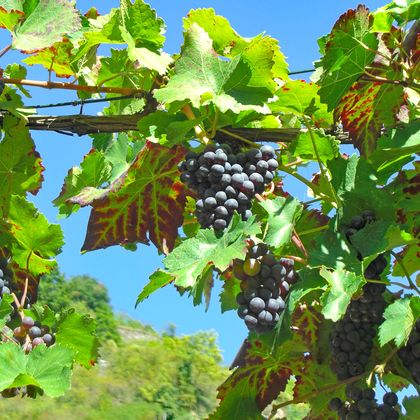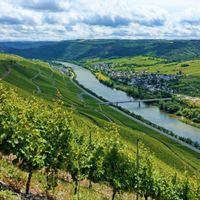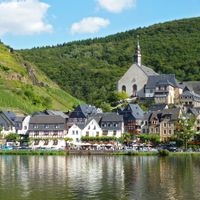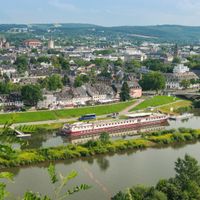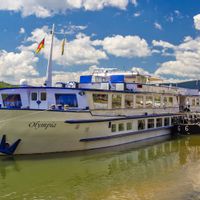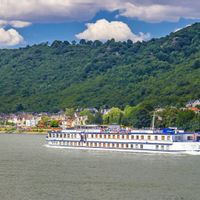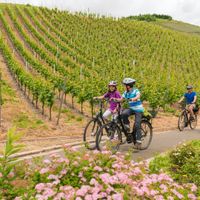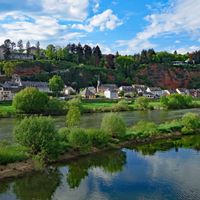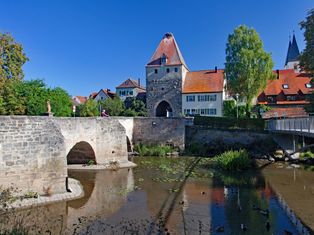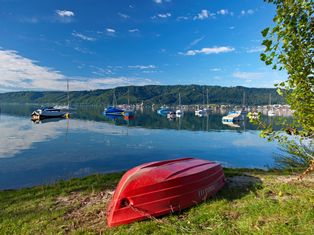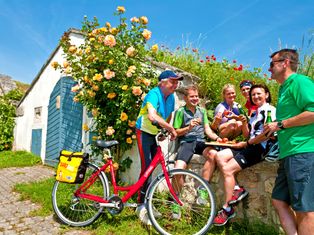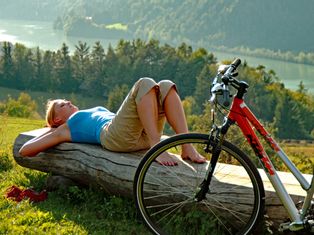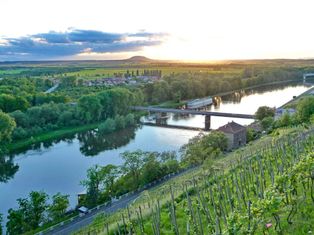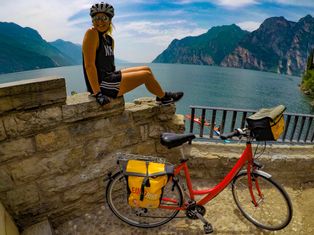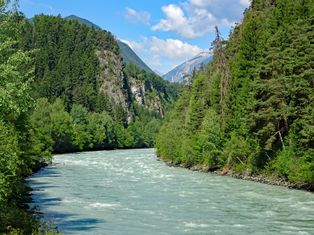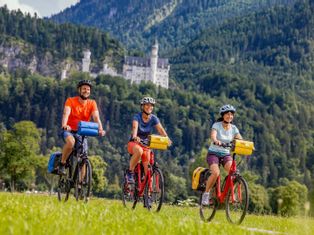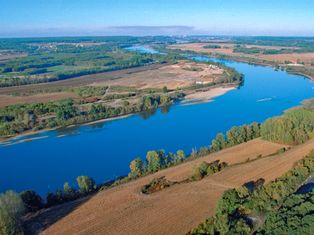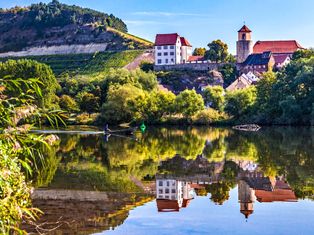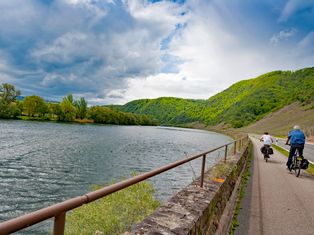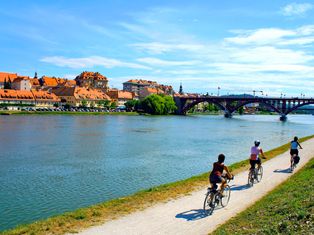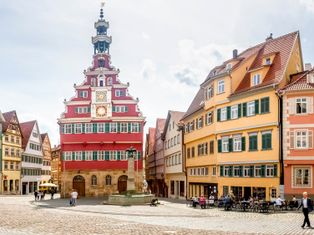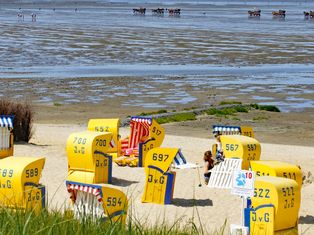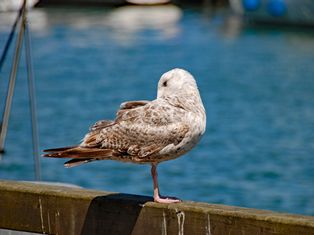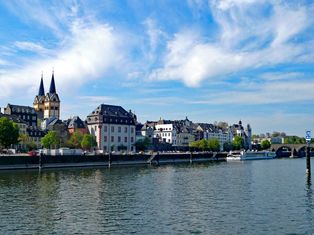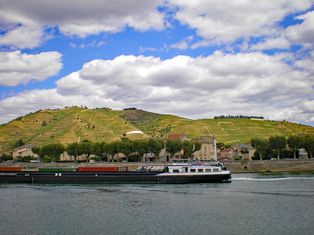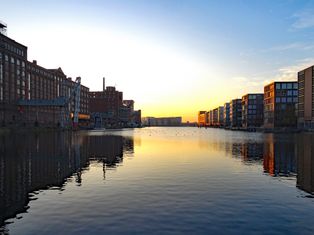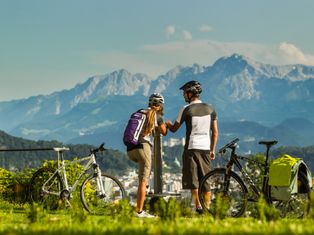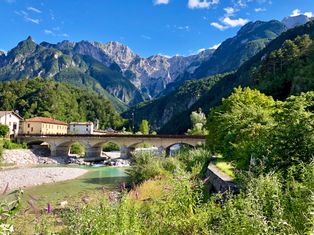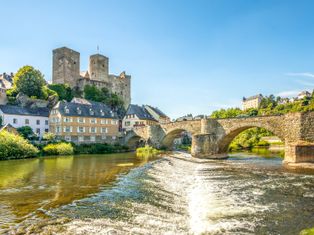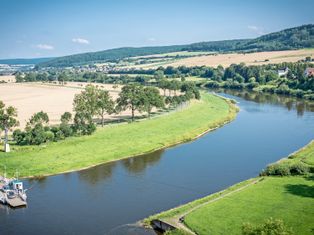The Moselle cycle path in brief
Official cycle path signage only begins in Metz. However, it is possible to cycle on your own along the Moselle from Bussang via Épinal and Nancy for about 195km. The Moselle cycle path is mostly paved from Metz and the route runs along the river. Depending on the course and infrastructure, cyclists are sometimes directed to the right or left banks of the river. From Metz to Koblenz the cycle path has a total lenght of 311 km.
Despite the surrounding hilly vineyards, the route along the Moselle is relatively flat. Due to excellent short cut options by boat or train, the Moselle cycle path is also suitable for less experienced cyclists and families.
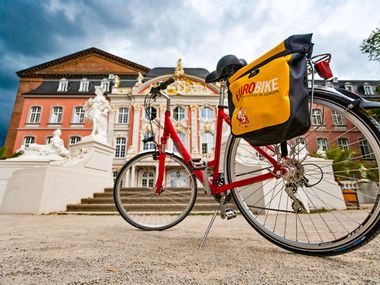
Tour tips for your cycling along the Moselle
Trier - Koblenz
On the route from Trier to Koblenz, there are some variations for you to choose from, offering everything a cyclist’s heart could desire. There are vineyards as far as the eye can see, beautiful towns and villages, culinary delicacies from the region and numerous other highlights. In addition to the classic 7-day option, you can alternatively opt for the 9-day leisure tour, if you prefer to cycle at a more leisurely pace. For wine lovers, the wine tour goes from vineyard to vineyard. In addition, we have the tour of Trier to Koblenz as a bike tour with charm in the programme. Decide for yourself which variant is for you!
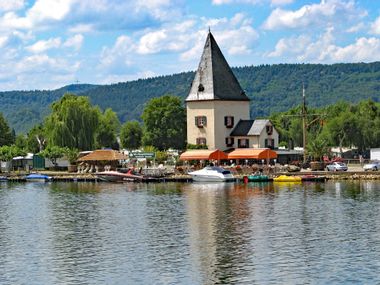
The Classic Moselle cycle path
Enjoy the Moselle from Trier to Koblenz over seven days with overnight accommodation in comfortable mid-range hotels or good guesthouses. You cycle past enchanting villages and towns, charming meandering rivers and the famous vineyards.
From vineyard to vineyard
On the winerytour tour on the Moselle you travel from Trier to Koblenz over six days. You stay in wine hotels and wineries as well as a city hotel. A special highlight of this tour is a cellar tour and wine tasting in Neumajgen,-Dhron, Burg/Reil and Pomerania.
Moselle cycle path with charm
The fantastic landscape along the Moselle offers pure fascination. But on this tour on the Moselle cycle path with charm you also stay in wonderful hotels. After your day’s touring you will stay overnight in select accommodation and relax in the wellness area. The unique restaurants will spoil you!
Metz – Koblenz
This cycle tour from Metz to Koblenz offers everything that connoisseurs appreciate about a classic long-distance cycle path. Starting in Metz, France you take in many wine villages, castles and fortresses along the way. Enjoy your cycling holiday in one of the most famous wine-growing regions and one of the most beautiful rivers in the heart of Europe.
Saarbrücken – Koblenz
On the cycle tour from Saarbrücken to Koblenz you will cycle along two well-known cycle paths: the Saar and the Mosel cycle path. This combination is really impressive! The Saar with its French flair and its industrial history and the meandering Mosel, where viticulture dominates the picture are your companions on this trip.
Luxemburg – Koblenz
The cycle tour Luxembourg – Koblenz starts in the vibrant, multicultural capital of the Grand Duchy of Luxembourg. Via the Perle on the Moselle Remich you cycle into the historic Trier and on to Koblenz.
Moselle and Saar with bike & boat
Moselle and Saar with bike & boat
The bike and boat tour Koblenz – Saarburg starts at the world famous Deutsche Eck in Koblenz. Over eight days you cycle along the Moselle and finally along the Saar to Saarburg – and all without re-packing your bags because your floating hotel the MS Olympia accompanies you from stage to stage. In the evening you can enjoy the vineyards from the comfort of the boat as you chat about your experiences that day. This varied journey is also possible in the opposite direction from Saarburg to Koblenz.
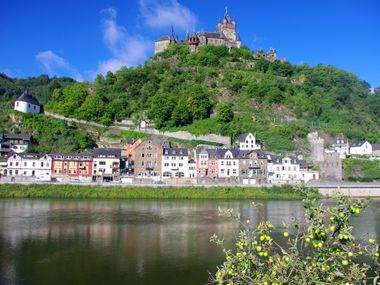
Moselle cycle path for families
Due to the flat route, the Moselle cycle path is also perfect for families. On the 8-day family cycle tour from Trier to Koblenz, or the 7-day tour for families from Trier to Cochem, you cover only a few kilometres per day. Numerous castles and historic buildings dot the way meaning you never run out of fun things to do. Waterparks provide refreshment and numerous playgrounds and museums await your visit.
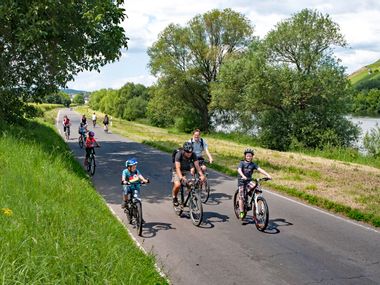
The course of the Moselle
The Moselle rises in France, then becomes the border river between Luxembourg and Germany. It runs mostly through Germany and flows into the Rhine.
Source of the Moselle
The origin of the river is in the Vosges at 715 metres, at the Col de Bussang, about 4km from the village of Bussang.
Course of the Moselle
At 544km, the Moselle is the second longest tributary of the Rhine. Travelling along its banks you first cross France, can visit Luxembourg and finally travel through Germany.
The end
In Koblenz on the man-made headlands named the “Deutsches Eck” the Moselle flows into the Rhine.
Height profile
The Moselle cycle path is signposted only from Metz at an altitude of about 171m and ends on the Rhine at about 60m above sea level.
Hight profile

Sections of the Moselle
The Upper Moselle
The section from the source to the Trier is called the Upper Moselle. This region is characterised by relatively low mountains and hilly landscapes.
The Middle Moselle
Between the Trier and Briedel you cycle along the Middle Moselle. Here you can experience typical Moselle loops and an excellent wine culture.
The Lower Moselle
The Lower Moselle runs from Briedel to Koblenz. This region is also characterised by vineyards along the route. In addition, magnificent castles tower over the river, testifying to the historical importance of the region.
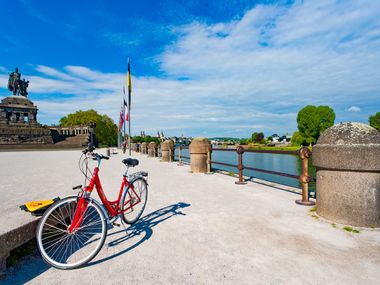
Questions and answers about the Moselle Cycle Path
Cities along the Moselle
As already mentioned, the region along the Moselle is mainly characterised by viticulture. As you cycle along the popular riverside path there are many romantic towns inviting you to linger. Enjoy regional delicacies and treats in traditional taverns. Of course sampling a few glasses of wine should not be missed, because wines of the Moselle are world famous!
Metz
The city of Metz is known for its stained glass windows. Here, the Seille flows into the Moselle. Visit numerous Roman and Renaissance museums, such as the Cour d’Or. You can also take in the Basillica of St. Pierre aux Metz, the Templar Chapel and the Imperial District.
Thionville
Thionville is also called Diedenhofen in German and is the centre of French steel production. It is also home to the largest inland port of France for the transport of metallurgical products. Again and again, this city was a bone of contention between Germany and France. The belfry, the town hall and the tower “Tour aux Puces” have seen an eventful history.
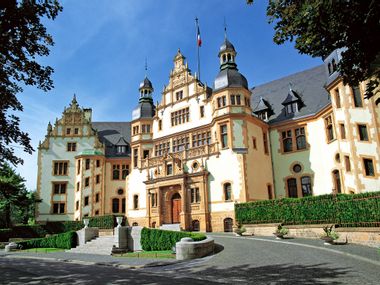
Schengen
Schengen is a small wine village with great importance. The place was formerly called Remerschen and was renamed in 1985 after the signing of the Schengen Agreement. On the banks of the Moselle, therefore, are the European Museum and the Monument to Europe. In 2010, a part of the Berlin Wall was erected as a monument there. Castle Schengen is also worth a visit.
Luxembourg
Although the city of Luxembourg is not directly on the Moselle, it is the starting point for a beautiful cycle tour on the river. In the capital of the Grand Duchy, history and modernity are perfectly combined. Visit the palace, the Bockfelsen, the Place d’armes in the city centre or the banking museum. There are many EU administrative buildings on the Kirchberg plateau, as well as the European Court of Justice.
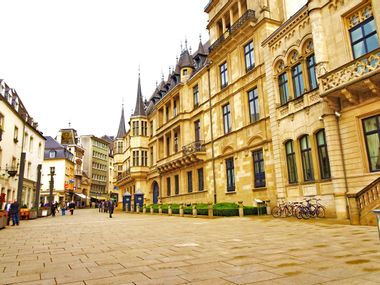
Saarbrücken
The university town of Saarbrücken is also not directly on the Moselle, but is also a wonderful starting point for the cycle path. The city is considered the economic and cultural heart of Saarland. Get carried away by the old town with the town hall, Ludwigskirche and the Saarländer town theatre!
Trier
Trier is the oldest city in Germany and is a UNESCO World Heritage Site. Many Roman monuments testify to the age of the city, such as the Amphitheatre, the Barbarathermen, Porta Negra, the Roman bridge and the Igler column. In the university town there are also monuments from the Middle Ages such as the Dreikönigshaus or the oldest cathedral in Germany, St Peter’s Cathedral.
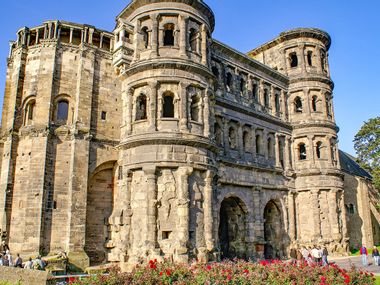
Piesport
Here in Piesport, there is a great Roman history. During excavations, an intricate glass was found in a sarcophagus, which is now exhibited in the Rheinisches Landesmuseum in Trier. Admire the 85m high natural monument directly on the Moselle, the Mosellorelley – a steep rock massif. This place is characterised by viticulture and many taverns invite you to linger.
Traben-Trarbach
Germany’s first electronic street lighting was installed here, together with the Bavarian town of Bad Reichenhall. And there is much more to discover here: the romantic Parkschlösschen Bad Wildstein, the Mont Royal Fortress, the gate to the Moselle Bridge or the former slate and ore mine Gonau.
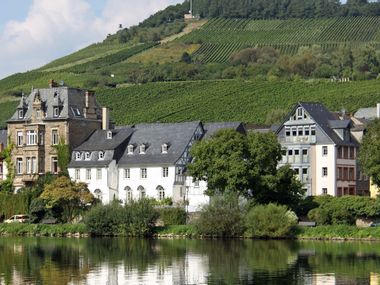
Cochem
You should make time to spend in Cochem. Because a ride on the chair lift to the Pinnerkreuz is worth it! It’s also worth paying a visit to the old tollgate and customs gate and the historic mustard mill. In the Reichsburg Cochem you can admire the Linden trees, which have been growing in the courtyard for 550 years.
Koblenz
In Koblenz, the Moselle finally flows into the Rhine. Those who haven’t cycled enough will find a connection to the Lahn or Rhine cycle paths here. The city is one of the oldest cities in Germany and parts of it are UNESCO World Heritage Sites. Make sure you have enough time to visit the city. Although about 87% of the city was destroyed in the Second World War, there is much to discover thanks to the loving reconstruction.
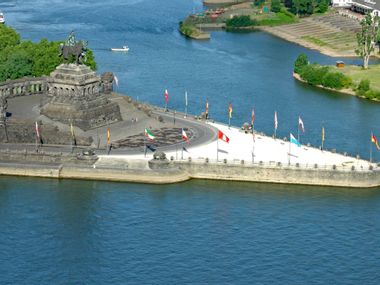

I am looking forward to your questions about the Moselle Cycle Path and the bike tours we offer along the Moselle!
